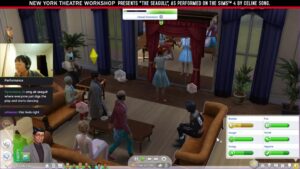I would like to take a moment to acknowledge the land on which I have grown up. For thousands of years, this land has been the home of Matinecock people, one of thirteen Algonquian tribes on Long Island. I am grateful to have grown, lived, and learned here on their traditional lands. Despite continuous violence and forced removal, the Matinecock are still here on this land. Ann Harding Murdock, in particular, reactivated the Matinecock tribe in 1958. In 1975, the Matinecock began to revitalize their religion, reviving four religious ceremonies to date. These ceremonies include Nunnowa, held in October, a community gathering at harvest time largely surrounding food; a midwinter ceremony that takes place in February; naming ceremonies; and pipe ceremonies.
You may have found yourself being exhausted at theatre happening over Zoom. I know I am. More often than not, these productions feel like consolation prizes rather than a stride in innovating and creating new forms of theatre; they remind me what I’m missing out on. Virtual theatre has excited me so much as a creator because of its new abilities to interact with the audience more than ever before. Every time I enter a new Zoom room for yet another digital production I hope there will be an attempt to draw the audience in. However, there often is not; without the sense of intra-audience and cast-audience community created by live theatre, digital theatre can sometimes fall flat. Dissatisfied with Zoom theatre, I was enthralled to hear about Celine Song’s recent Sims 4 production of Anton Chekhov’s The Seagull.
You heard me right. Celine Song, a Canadian playwright, performed The Seagull on Sims 4, streaming the production on Twitch. Ahead of performance, Song “cast” the actors by designing characters on Twitch livestream with an audience. What is so exciting about this production is the potential for audience participation—livestream viewers may chat during the production and give suggestions to Song—and the unpredictability of the Sims. As Song tells Polygon, “In The Sims, we as players are both Gods and voyeurs. That seemed to closely resemble the experience of writing and watching a play as a playwright, but without the living, breathing humans as the actors.”*
This consideration brings me to my question: why have we been limiting ourselves to Zooms and livestreams? If The Seagull can be performed on the Sims, what more is possible? An Among Us play is an exciting option; with the ability to change game settings and lack of knowing who the imposter will be, this provides ample opportunity for an exciting performance that necessitates improvisational skills and allows audiences to make decisions on who gets to stay. Representative Alexandria Ocasio-Cortez recently Twitch-streamed Among Us with Representative Ilhan Omar and others to get out the vote, garnering 400,000 views.
Another option is Club Penguin Rewritten, a re-coded version of the popular game that closed in 2017. This allows for games, mysteries, and much larger ensembles to participate. Audiences could even watch the play and follow along in the actual server. It almost reminds me of Sleep No More, the popular immersive site-specific production of Macbeth at the McKittrick hotel in New York. Animal Crossing, the Nintendo Switch game that took the world by storm at the beginning of quarantine, offers another possibility that combines the godlike controlling nature of The Sims with the interactive and participative nature of Among Us and Club Penguin.
Though I certainly miss going to live theatre and eagerly await the opening of theater doors once again, I am also excited by the possibilities and challenges that virtual theater presents us with. Creative constraints and obstacles often lead to one’s most innovative work and I cannot wait to see more of what Song, and other theatremakers, come up with.
Watch Part 1 of Song’s performance here.
*Carpenter, Nicole. “Hundreds of people watched a play unfold in The Sims 4,” Polygon.
Regan Lavin
She/her/hers
DSF Digital Internship Participant
Stanford University | B.A. American Studies 2022

